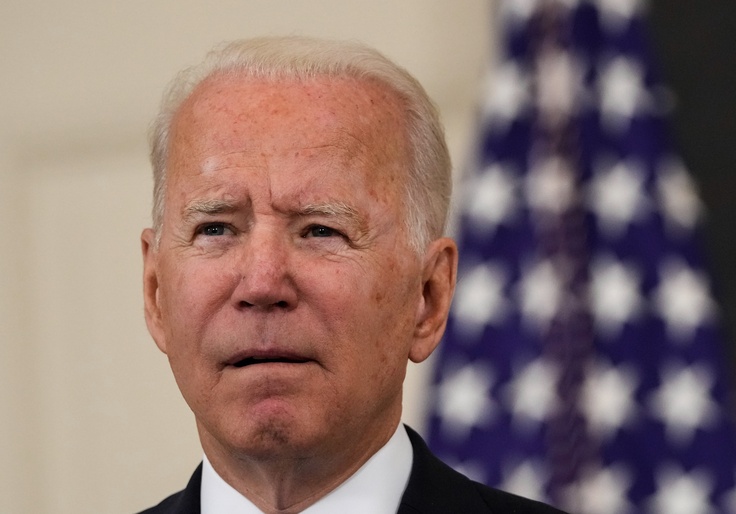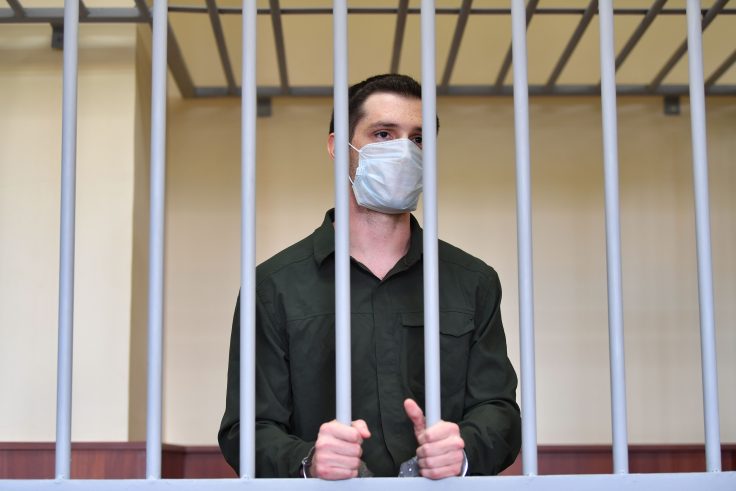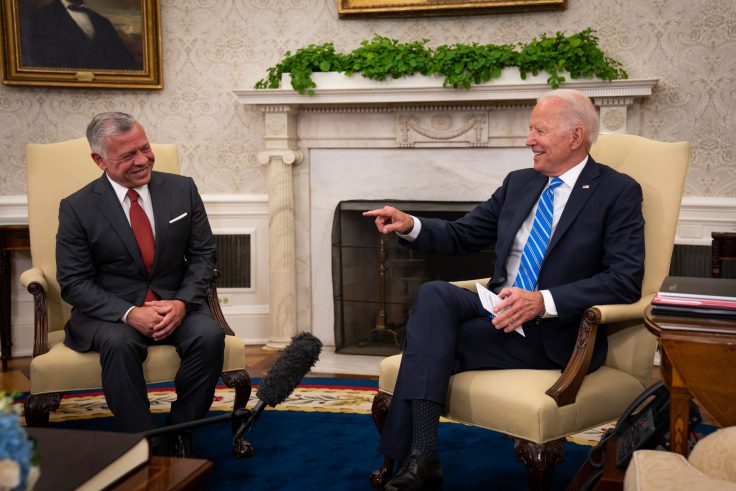The Taliban Kidnapped a Navy Vet in Afghanistan. The Biden Administration Risks Leaving Him Behind.
Mark Frerichs held hostage in Afghanistan as U.S. military completes withdrawal

The Biden administration's full withdrawal from Afghanistan could leave behind a U.S. Navy veteran kidnapped by the Taliban.
Haqqani network operatives backed by the Taliban abducted Mark Frerichs, a civilian contractor in Afghanistan for the U.S. government, in January 2020. The government has made little progress in retrieving the Navy veteran. U.S. authorities have been able to establish that Frerichs is alive, but have yet to disclose his whereabouts. The State Department has briefed lawmakers in recent weeks, but according to Rep. Mike Waltz (R., Fla.), a former Green Beret in Afghanistan and lead advocate for bringing Frerichs home, the Biden administration's opacity has hindered the urgent recovery operation.
"I am incredibly frustrated by their lack of responsiveness and lack of answers," Waltz told the Washington Free Beacon. "The question is: What's the plan now?"
The United States faces dwindling leverage over the Taliban amid a public deadline for withdrawal. As the Biden administration completes a full evacuation of military forces from Afghanistan, the Taliban are waging a violent offensive across the country, effectively squeezing the Afghan government—which receives backing from the United States—out of power. President Joe Biden conceded in a July speech that the Taliban are at their strongest since 2001, and analysis from the Foundation for Defense of Democracies shows the terrorists took control of some 139 districts in the country in two months. American nationals are not the sole focus of the pull-out. The State Department is scrambling to evacuate Afghan translators from the country as the Taliban steamroll through local security forces.
The State Department, Justice Department—which often plays a role in international hostage negotiations—and White House did not return requests for comment. Biden mentioned Frerichs's name for the first time in a July speech, but it is unclear if government authorities have yet met with the hostage's family. A U.S. government official familiar with the matter, who requested anonymity to speak candidly, told the Free Beacon they are working on Frerichs's release with "focused purpose."
"Mark shouldn't be held against his will far away," the official said. "He should be home with his family. As the president said in his remarks to the American people about Afghanistan a couple of weeks ago, we are going to continue to work for the release of detained Americans, including Mark. Our team is very focused on Mark's case, bringing together experts from across the government."
Bill Roggio, a senior fellow at the Foundation for Defense of Democracies, said the dwindling strength of America's position makes for much tougher negotiations with the Taliban to secure the release of hostages.
"The United States continues to back negotiations with the Taliban as they rampage across Afghanistan, so I'm not sure what kind of leverage the U.S. government has to secure Frerichs's release," Roggio said. "The United States just continues to look weaker and weaker while the Taliban continue to look stronger. The administration has very tough cards to play. They basically need to give up the deck to get one card back."
Roggio also noted that the United States' slipping foothold in Afghanistan could up the Taliban's asking price to return Frerichs. The Taliban have repeatedly asked for the return of Bashir Noorzai, a narcotics trafficker often called the "Pablo Escobar of the Middle East," in exchange for Frerichs—a price which Roggio says comes with complications.
Another possible play left in the Biden administration's playbook could be appealing to Pakistan, a U.S. ally that has consistent channels of communications with the Haqqani network. When Afghan terrorists kidnapped U.S. citizen Caitlan Coleman and her husband in 2012, it took close cooperation with the Pakistani government to get a breakthrough in their case in 2017. Lisa Curtis, a former senior White House official who worked on Afghan issues and program director at the Center for a New American Security, told the Free Beacon that looking to Pakistan could prove vital.
"Now that U.S. forces are out of Afghanistan, we are really going to have to look to the Pakistanis to use their leverage with these groups to get him released," Curtis said. "It took a great deal of pressure from the Trump administration on the Pakistani government [to secure Coleman]. I'm not sure the Biden administration has exerted that kind of influence with the Pakistanis. …We're losing leverage very fast now."
Frerichs's family could not be reached for comment in time for publication.
Russia Sends U.S. Marine to Soviet-Era Gulag
Trevor Reed has been imprisoned in Russia for more than one year

Russian authorities transferred a U.S. Marine veteran imprisoned in the country for more than a year to a penal colony in a region known for Soviet-era gulags.
Trevor Reed, who served in a Marine security detail tasked with protecting then-president Barack Obama, will likely serve the remainder of a nine-year sentence in a penal colony some 217 miles away from Moscow.
Reed spent last year in multiple prisons. The American embassy and Reed's family say Russia subjected the Marine veteran to brutal conditions, denied him medical treatment, and limited his access to diplomatic services. In March, Russia moved Reed to a maximum-security facility in Moscow without notifying American diplomats, likely violating international treaty law.
A Russian human rights organization said Friday that Reed was transferred from his small cell in Moscow to Mordovia, a region with penal colonies for political prisoners. Reed will join fellow Marine veteran and American citizen Paul Whelan in the region. Whelan, who was arrested on espionage charges in 2018, was moved to a penal colony in August 2020. He has complained of abuse and mistreatment from Russian authorities.
Lawmakers have called for Reed's release for months, with House Foreign Affairs Committee ranking member Michael McCaul (R., Texas) and Reed's congressman, August Pfluger (R., Texas), leading the efforts. In more than seven months in office, the Biden administration has secured the release of just 1 hostage abroad, while over 50 Americans remain detained.
A resolution pressuring the Biden administration to bring Reed home passed the House in June and awaits a vote in the Senate. President Biden first raised Reed and Whelan's status in his June summit with Russian president Vladimir Putin. Biden has given no public update since then. In June, Putin called Reed a "drunk" and said he needs more time to consider a prisoner swap.
Reed's transfer comes days after Biden climate envoy John Kerry met with Russian foreign minister Sergey Lavrov to advance cooperation on climate change policy. Lavrov, who has defended the Putin regime's human rights violations, has acted as the State Department's primary point of contact for discussing Trevor Reed.
Rep. Don Bacon (R, Neb.), who cochairs the House Baltic Caucus, told the Washington Free Beacon that the president's inaction on Reed's case is just one of several missteps on Russia.
"President Biden now and over the years has talked loudly but carried a small stick in regards to Russia," Bacon said. "Pulling sanctions on the Russian pipeline while shutting down our Keystone Pipeline and American jobs, caving on strategic nuclear talks, and not pushing Putin on dissidents and hostages reflect that. Actions speak louder than words."
The State Department did not return a request for comment.
Biden Passes Up Chance To Press Jordan’s King for Terrorist’s Extradition
"You've got to bring this person to justice," victim's father tells Free Beacon after Biden neglects issue at meeting with King Abdullah II

In the face of emotional pleas from a young terror victim's family, President Joe Biden on Monday passed up an opportunity to press Jordan's King Abdullah II on the Palestinian terrorist who remains a free woman in the Middle Eastern kingdom.
Although the White House maintains it is working to extradite Hamas terrorist Ahlam Tamimi from Jordan, Biden neglected the issue entirely during his Monday afternoon meeting with King Abdullah. Neither the public meeting nor the White House readout of what the leaders discussed privately included any mention of Tamimi.
Arnold Roth, whose 15-year-old daughter was killed in the 2001 bombing of an Israeli restaurant carried out by Tamimi, said the United States is "betraying its own values" by not raising the issue.
"The United States is betraying its own values, its own commitment to justice, and this I find to be inexplicable," Roth told the Washington Free Beacon following Biden’s meeting with Jordan’s king. "There’s always a price when you trash core values."
Ahead of Biden's meeting with the Jordanian king, Roth and his wife Frimet took to the pages of the Wall Street Journal, urging Biden to press for Tamimi's extradition. "The president, a grieving parent himself, pledged during his inauguration speech to write ‘an American story of decency and dignity,'" the parents wrote last week. "Is anything more dignified than doing justice?"
Abdullah’s meeting at the White House came on the tail end of a three-week trip to the United States. The Jordanian leader is lobbying for an extension of U.S. foreign aid to Jordan, which is set to expire next year. Roth said aid provides the perfect leverage for the Biden administration to get cooperation on the case of Tamimi, who was released to Jordan through a 2011 prisoner swap.
"The degree of dependence on the United States is huge," Roth said. "The notion in principle terms that the United States should use its irreplaceable, key role in Jordanian affairs to look after American interests, and in this case, not political interests, but the interests of simple justice, is self-evident."
"Why aren't people as shocked as I am? I don't know, I'm really baffled by this," Roth said.
The Trump administration set the stage for America to take action on the case of Tamimi. In 2017, the Department of Justice unsealed the details of Tamimi’s charges in the deadly 2001 attack, which killed 15 people including two Americans. Tamimi was also added to the FBI’s Most Wanted List, where she still remains. Trump’s State Department said in 2019 that Jordan was required to hand over Tamimi based on a 1995 extradition treaty, but Jordan refused to comply.
A White House National Security Council spokesman said the United States seeks "[Tamimi's] extradition and the government of Jordan’s assistance in bringing her to justice."
Tamimi lives with her family in Jordan and regularly discusses the successful terrorist attack that killed Roth’s daughter, Malki Roth. Shortly after her 2011 release, Tamimi said she would "do it again" if given the chance.
"I dedicated myself to the path of jihad for the sake of Allah, and Allah granted me success," Tamimi said in a Jordanian television interview. "Do you want me to denounce what I did? That's out of the question. I would do it again."
Tamimi became a regular contributor on Al-Quds TV, a now-defunct Hamas-run propaganda outlet, and is a columnist for Egypt’s Arabi 21, where she regularly praises Palestinian terrorists. In a column published Monday, for example, Tamimi praises fellow terrorist Qahira Saadi, who drove a suicide bomber to the center of Jerusalem and killed three Israeli civilians. Saadi, described as a "liberated captive," was also released in the 2011 prisoner exchange.
Roth said Tamimi is treated as a "success model" in the Arab world.
"The murderer has had her own damned TV program, and she gives speeches where thousands of people come along," Roth said. "She’s been shipped all over the Arab world to make speeches because she’s such a fantastic example, and students at the Jordan Media Institute call her a success model."
Roth said Biden should have taken a "moral stand" with King Abdullah to press for Tamimi’s extradition.
"I'm compelled by the language that Biden has used himself about himself—he talks about principles and values, and he speaks about dignity," Roth said. "There are moral stands that a leader like Biden, the leader of the United States, can take, and can use as an instrument of policy, particularly foreign policy."
Biden during the meeting referred to Abdullah as a "good, loyal, and decent friend," adding that the United States "will always be there for Jordan."
Those who argue against pressing for Tamimi’s extradition say it would cause Jordan’s large Palestinian population to rise against King Abdullah, destabilizing the region. Similar arguments were made ahead of the Trump administration's move of the U.S. embassy to Jerusalem, and after the killing of Iranian commander Qassem Soleimani. Neither action resulted in lasting turmoil.
Jordan will receive approximately $1.65 billion in total financial and military assistance from the United States in 2021. This week alone, America directly transferred over half-a-billion dollars to Jordan’s treasury, the first part of an $845 million grant.
Israeli authorities arrested Tamimi shortly after the 2001 bombing and sentenced her to 16 life sentences. Judith Shoshana Greenbaum, a 31-year-old teacher from New Jersey, was also murdered in Tamimi’s attack.
"I'm coming at this as the father of a child, a child who was an American citizen who was murdered by this woman," Roth said. "You've got to bring this person to justice."
No comments:
Post a Comment